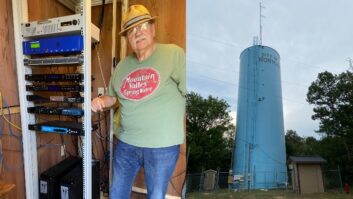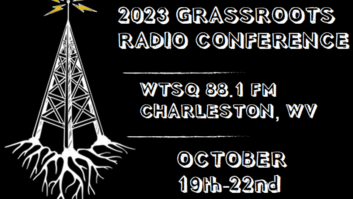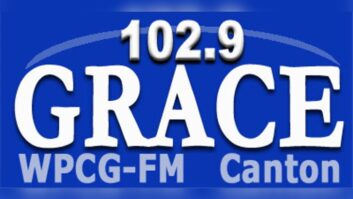
Pete Tridish of Prometheus, far left, working during a barn-raising in Peten, Guatemala, in 2004. Sanjay Jolly is the policy director for the Prometheus Radio Project.
This October, just a few days away, the FCC will open a filing window for non-commercial, low-power FM stations that could result in an unprecedented expansion of community radio. Since LPFM reemerged more than a decade ago, some 800 low-power FM stations have sprung up across the country, and that number could double or triple over the next few years.
LPFM is good for radio. The opportunities that it presents, especially now that restrictions keeping LPFM out of large and medium cities have been lifted, should inspire radio professionals and enthusiasts to actively support its expansion.
HYPER-LOCAL
Since 1996, consolidation has transformed the radio industry. Commercial conglomerates have replaced local programming with a few formats that are identical from New York to Wichita. While current radio formats have their strengths, the sense of local identity and culture has largely been lost.
LPFM returns hyper-local radio to the airwaves. In a rebuke to the overwhelming effect of consolidation in FM, LPFM stations are licensed only to local non-profit organizations, and each group may apply for only one license. With a small transmitting area and relatively low barriers to startup, LPFM is a way to return the power of radio back to ordinary people. It is radio by the community and for the community.
Consider KOCZ(LP) in the Louisiana city of Opelousas.
Opelousas is home to Zydeco music, a Cajun-Creole tradition beloved in southwest Louisiana for centuries. Despite being well-loved and central to Opelousas’s identity, Zydeco was absent from the city’s airwaves for years. Then, in 2003, a local group started KOCZ(LP), playing Zydeco along with local news, jazz, R&B and Sunday gospel.
Ten years later, the other stations in Opelousas haven taken a cue from KOCZ, and the region’s musical heritage is kept alive through radio.
The low cost and relatively simple technical requirements mean that LPFM brings radio to people who could otherwise never get involved, including churches, youth, local governments, civic organizations, arts and culture advocates, and others. And by lowering financial barriers and establishing ownership limits, LPFM encourages the participation of women and people of color, both of whom have been historically shut out of media ownership.
To meet the needs of rapidly changing populations, LPFM stations often offer programming in Spanish and other languages not served by other local stations. Bringing new voices on the air is not just good for communities, it’s good for radio and its relevance as a medium.
LPFM stations may also bring new talent to the radio industry in general. As many stations are staffed primarily by volunteers, LPFM stations serve as training grounds for aspiring deejays, producers and engineers, laying a valuable groundwork for the future of radio leadership.
Finally, LPFM expansion makes efficient and effective use of the remaining FM spectrum. Across the country, LPFM will serve communities in the spaces on the dial where full-power stations will not fit. Concerns over LPFM interference on the third adjacent frequency have long ago been debunked, and on the second adjacent frequency, LPFM stations can now operate just as translators do, with the same robust interference protections and mitigation for full-power stations.
For communities with no room for new full-power radio, LPFM is the best use of the FM band.
ONCE IN A LIFETIME
For 15 years, the Prometheus Radio Project has worked to advance the cause of community radio. We helped push the FCC to create a new low-power service, worked with dozens of organizations to start stations and advocated for fair LPFM regulations.
Prometheus led the fight to win passage of the Local Community Radio Act, which directed the FCC to expand LPFM licensing and eliminated restrictions that kept LPFM off the air in major cities. Over the course of a decade, we built a grassroots network of LPFM advocates who lobbied Congress for community media access. And in 2011, the bill was signed into law by President Obama.
Now, on the cusp of October’s LPFM filing window, Prometheus is helping local community organizations to take advantage of this once-in-a-generation opportunity. We are promoting public awareness through press and outreach, and we are directly supporting LPFM hopefuls to apply for station licenses. Prometheus offers free online training and educational materials; the open source channel allocations software RFree; and a phone help desk for LFPM applicants.
Radio engineers, producers and other professionals have an important role to play in the success of LPFM. They can encourage organizations to apply, volunteer to support local applicants or apply for licenses directly. Many of those applying for stations are local groups with great things to offer their communities, yet are new to radio. The expertise of a local volunteer can go a long way in helping a new radio project to get off the ground.
If you are considering how you can support LPFM, a good place to start is Radio Spark (www.radiospark.org), an online community for groups applying for LPFM licenses and for those who want to help them. By connecting allies, Radio Spark allows experts and novices alike to ask questions, share resources, recruit volunteers and build networks.
If you’re an engineer or other professional offering services to new LPFM stations, you can list yourself as a resource. You can also visit Prometheus’s website (www.prometheusradio.org), where you can find training, handouts and more background on LPFM.
While the current radio landscape serves audiences in many important ways, LPFM will make radio better. It will promote local production, create creative new programming and expand the role of radio in people’s lives. But for LPFM to achieve its full promise, people like you must actively support and participate in its success. Be a part of radio’s future.
Founded in 1998, Prometheus builds, supports and advocates for low-power radio stations. It was founded in 1998. Learn more atwww.prometheusradio.org.
Comment on this or any story. Email [email protected] with “Letter to the Editor” in the subject line.











